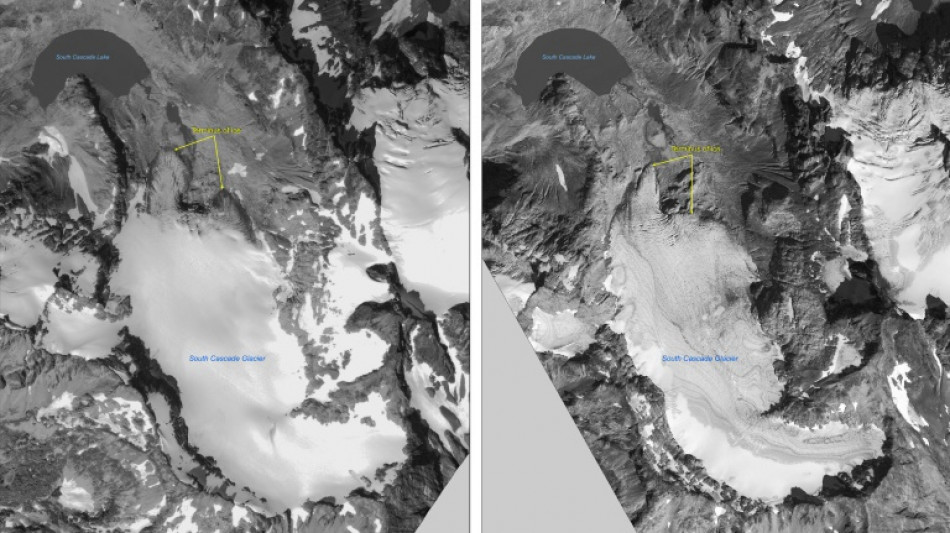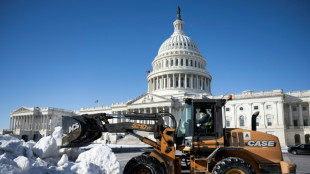
-
 Finland building icebreakers for US amid Arctic tensions
Finland building icebreakers for US amid Arctic tensions
-
Petro extradites drug lord hours before White House visit

-
 Disney names theme parks chief Josh D'Amaro as next CEO
Disney names theme parks chief Josh D'Amaro as next CEO
-
Disney names theme parks boss chief Josh D'Amaro as next CEO

-
 Macron says work under way to resume contact with Putin
Macron says work under way to resume contact with Putin
-
Prosecutors to request bans from office in Le Pen appeal trial

-
 Tearful Gazans finally reunite after limited Rafah reopening
Tearful Gazans finally reunite after limited Rafah reopening
-
Iran president confirms talks with US after Trump's threats

-
 Spanish skater allowed to use Minions music at Olympics
Spanish skater allowed to use Minions music at Olympics
-
Fire 'under control' at bazaar in western Tehran

-
 Howe trusts Tonali will not follow Isak lead out of Newcastle
Howe trusts Tonali will not follow Isak lead out of Newcastle
-
Vonn to provide injury update as Milan-Cortina Olympics near

-
 France summons Musk for 'voluntary interview', raids X offices
France summons Musk for 'voluntary interview', raids X offices
-
Stocks mostly climb as gold recovers

-
 US judge to hear request for 'immediate takedown' of Epstein files
US judge to hear request for 'immediate takedown' of Epstein files
-
Russia resumes large-scale strikes on Ukraine in glacial temperatures

-
 Fit-again France captain Dupont partners Jalibert against Ireland
Fit-again France captain Dupont partners Jalibert against Ireland
-
French summons Musk for 'voluntary interview' as authorities raid X offices

-
 IOC chief Coventry calls for focus on sport, not politics
IOC chief Coventry calls for focus on sport, not politics
-
McNeil's partner hits out at 'brutal' football industry after Palace move collapses

-
 Proud moment as Prendergast brothers picked to start for Ireland
Proud moment as Prendergast brothers picked to start for Ireland
-
Germany has highest share of older workers in EU

-
 Teen swims four hours to save family lost at sea off Australia
Teen swims four hours to save family lost at sea off Australia
-
Ethiopia denies Trump claim mega-dam was financed by US

-
 Norway crown princess's son pleads not guilty to rapes as trial opens
Norway crown princess's son pleads not guilty to rapes as trial opens
-
Russia resumes strikes on freezing Ukrainian capital ahead of talks

-
 Malaysian court acquits French man on drug charges
Malaysian court acquits French man on drug charges
-
Switch 2 sales boost Nintendo profits, but chip shortage looms

-
 China to ban hidden car door handles, setting new safety standards
China to ban hidden car door handles, setting new safety standards
-
Switch 2 sales boost Nintendo results but chip shortage looms

-
 From rations to G20's doorstep: Poland savours economic 'miracle'
From rations to G20's doorstep: Poland savours economic 'miracle'
-
Russia resumes strikes on freezing Ukrainian capital

-
 'Way too far': Latino Trump voters shocked by Minneapolis crackdown
'Way too far': Latino Trump voters shocked by Minneapolis crackdown
-
England and Brook seek redemption at T20 World Cup

-
 Coach Gambhir under pressure as India aim for back-to-back T20 triumphs
Coach Gambhir under pressure as India aim for back-to-back T20 triumphs
-
'Helmets off': NFL stars open up as Super Bowl circus begins

-
 Japan coach Jones says 'fair' World Cup schedule helps small teams
Japan coach Jones says 'fair' World Cup schedule helps small teams
-
Equities and precious metals rebound after Asia-wide rout

-
 Do not write Ireland off as a rugby force, says ex-prop Ross
Do not write Ireland off as a rugby force, says ex-prop Ross
-
Winter Olympics 2026: AFP guide to Alpine Skiing races

-
 Winter Olympics to showcase Italian venues and global tensions
Winter Olympics to showcase Italian venues and global tensions
-
Buoyant England eager to end Franco-Irish grip on Six Nations

-
 China to ban hidden car door handles in industry shift
China to ban hidden car door handles in industry shift
-
Sengun leads Rockets past Pacers, Ball leads Hornets fightback

-
 Waymo raises $16 bn to fuel global robotaxi expansion
Waymo raises $16 bn to fuel global robotaxi expansion
-
Netflix to livestream BTS comeback concert in K-pop mega event

-
 Rural India powers global AI models
Rural India powers global AI models
-
US House to vote Tuesday to end shutdown

-
 Equities, metals, oil rebound after Asia-wide rout
Equities, metals, oil rebound after Asia-wide rout
-
Bencic, Svitolina make history as mothers inside tennis top 10


In US Northwest, South Cascade is where glacier science grew up
For nearly 70 years scientists have been probing, measuring, drilling and generally getting to know South Cascade Glacier in the US Northwest, developing and honing skills now used worldwide.
Generations of glaciologists have studied the slow-moving ice mass in Washington state, which is one of five so-called "benchmark" US glaciers, keeping tabs on how they are changing as human activity warms the Earth.
While glaciers have been studied in Europe since at least the 19th century, what scientists learned here has been invaluable.
"A lot of the scientific methods that we use to measure glaciers were developed here," said Andrew Fountain, professor emeritus at Portland State University, who specializes in glaciers and climate change.
That includes the use of ice radar, which allowed researchers to see just how thick the ice is in a spot where a glacier has probably existed for upwards of a million years.
- Ideal for studying -
South Cascade Glacier sits in a basin at the head of the South Fork of the Cascade river, which flows down ultimately into Puget Sound.
The size of the basin -- more than 2 square miles (over 6 square kilometers) -- along with its straightforward geometry made it ideal to study for scientists wanting to know how these dynamic bodies are faring in the changing world.
A glacier is a perennial accumulation of snow and ice that is always on the move, abrading the rocks underneath and -- over a long enough period of time -- carving valleys.
Measurements began at the site in 1958, according to the US Geological Survey, the government body that studies the natural environment.
The following year, the USGS began what is known as a "continuous mass balance" measurement project that keeps a running tally of streamflow runoff, precipitation, air temperature, barometric pressure, snow thickness and density, ice ablation, surface speed and surface altitude.
- Retreating -
The data collected here, as well as from the four other benchmark glaciers -- three in Alaska and one in Montana -- provides a continuous record, capturing their seasonal variations and their year-to-year changes.
Over nearly seven decades, glaciologists have been able "to track how the glacier is responding to climate."
And what they are seeing is not good, says Fountain.
"As you can imagine, it's been retreating like crazy" and is now about half the size it was when measurements started.
With a very complete record of the conditions, it's clear that the rising temperatures of the industrial age are to blame, said Fountain.
A warmer atmosphere reduces the amount of precipitation that falls as snow, and increases the ambient air temperature so what snow does fall, doesn't hang around.
While people may find it difficult to discern any long-term trends from the wildly differing amounts of snow a region can experience from year to year, a shrinking glacier is an obvious sign that the balance of nature is off.
"We can understand very viscerally that the climate is warming," he said.
Since President Donald Trump -- a climate change skeptic -- came to power, he and billionaire adviser Elon Musk have set about slashing government spending, eliminating tens of thousands of government jobs, including scientists.
This week, researchers at the Environmental Protection Agency -- which tackles environmental issues including pollution, clean water and climate change -- were put in the firing line.
For Fountain, whatever the reason a government has for diminishing the work of scientists, they should not be ignored.
About two percent of the world's water is stored in glaciers, and if they all melt, it will run eventually into the oceans, further raising sea levels and imperiling human settlements along tens of thousands of miles (kilometers) of coastlines worldwide.
That, amongst other reasons, is why the science of glaciology that came of age at South Cascade Glacier is invaluable, said Fountain.
"Just because we don't want to hear a message doesn't mean it isn't happening," he said.
K.Brown--BTB




